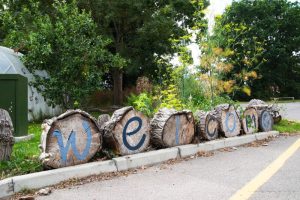This week saw the launch of the Green Impact project for the third consecutive year. Staff Sustainability Champions and interested students gathered at the Greenwich Campus to hear from the Vice Chancellor David Maguire and his vision for sustainability at the University and to learn more about what is in store for sustainability at the University over the coming months. Over the last two years the sustainability champions have produced some brilliant results using Green Impact as tool for embedding sustainability at a departmental level. In the first year the project ran the champions managed to undertake 561 positive sustainability actions, last year it was over 1500, it will be quite a challenge to continue that momentum but the enthusiasm in the room was palpable as we relaunched the project for this academic year!
The champions were introduced to the new Green Impact workbook, received an update from the Sustainability Team and collaborated to create behaviour change programmes using a specific planning model created by Action for Sustainability. With several new staff members joining the staff sustainability champions network this year John ran an induction session to kick off the days events before being joined by the returning champions and Sophia Perkins from the NUS for a general update on Sustainability.
At lunch everyone had the chance to quiz our new caterers Baxter Storey on their sustainability credentials and find out about how the food served at the University is sourced by their suppliers. M&J Seafood brought along a selection of fish that would be finding their way on to the University menu the following day including salmon, gurnard and sole. They gave us tips on how to tell how fresh a fish was, and told us about their sourcing, fishing and farming methods designed to ensure the long term sustainability, not only of the fish they sell but of their business as well. We were joined by Chegworth Valley, who had a wide range of different juices for us to try including, apple & beetroot, apple & elder flower and pear. The high quality of the juice was evident from the tasting session and the representative from Chegworth Valley explained to the group about the different varieties of apples they grow and the process that converts their fruit to the juice that ends up in the glasses of University of Greenwich staff and students.
Professor David Maguire, the University of Greenwich Vice Chancellor joined the staff champions after lunch to reiterate the university’s commitment to reducing carbon emissions, sustainability in general and offer his support to the champions in the work that they are undertaking. Following David’s visit we got stuck into the workshops. The sustainability champions mentioned positive changes that they would like to see made across their department so the first workshop tasked the champions with developing behaviour change campaign plans for implementing the positive changes. The results were quite impressive and showed a pragmatic path for engaging staff, students, improving heating, encouraging staff and students to switch off and for making the transformation to paperless offices.
Following the behaviour change workshop the sustainability champions were treated to Bruce Forsyth’s latest game show, ‘Play Your Carbon Cards Right’ where they guessed which university buildings were producing the highest carbon output compared over the first two weeks of October this year. The game show was designed to get everyone in the mood for testing the new Carbon Culture software that the University has invested in. The software allows anyone to monitor the carbon emissions, energy use and financial costs associated with powering the University’s buildings. The champions will be using the software this year to demonstrate carbon savings to their colleagues and students within their department and will be setting themselves some targets for carbon reduction as the year progresses.










